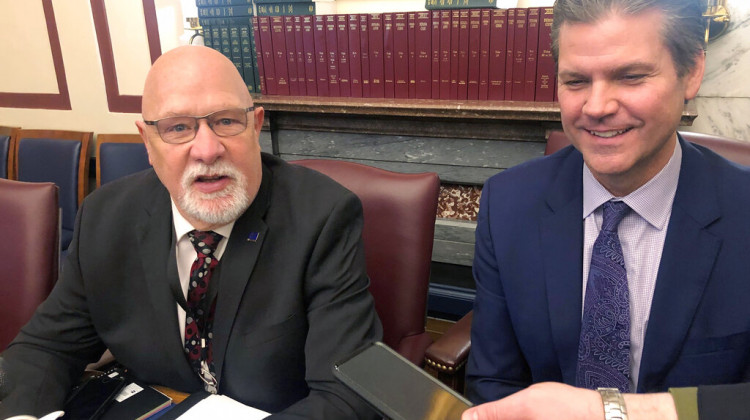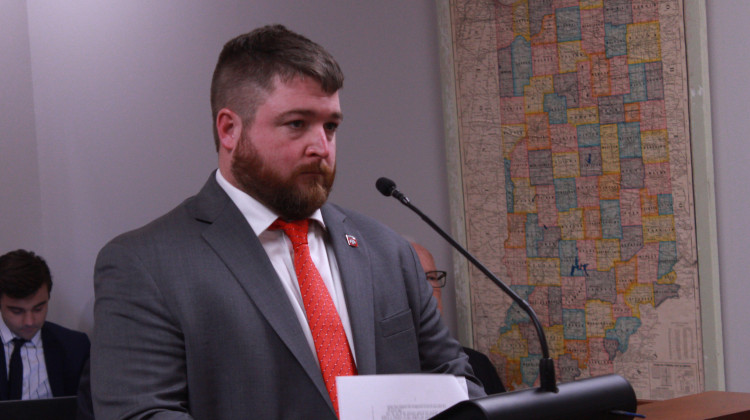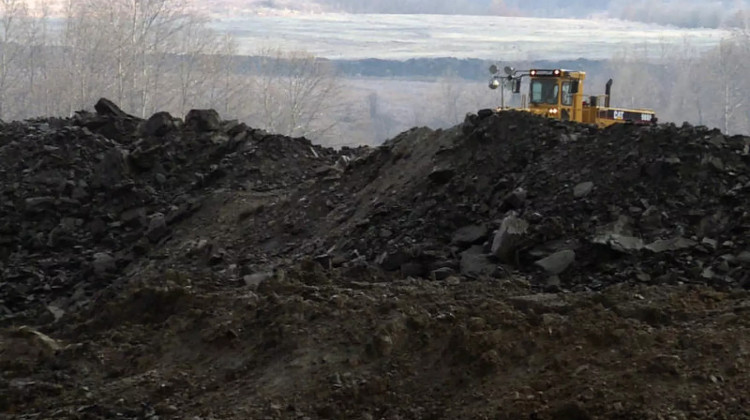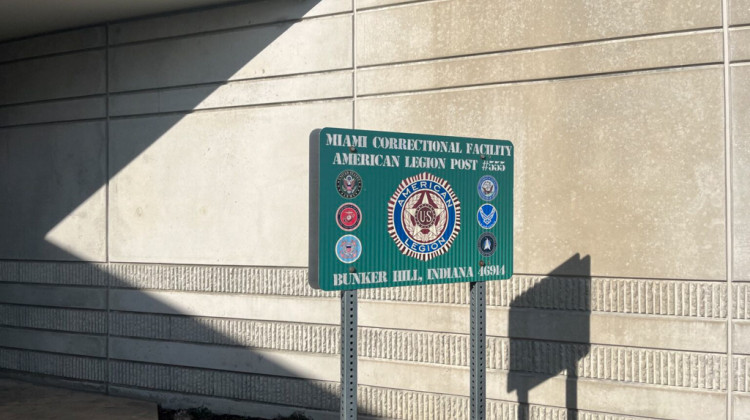
Indiana House Ways and Means Committee Chairman Tim Brown, R-Crawfordsville, left, talks with reporters alongside Senate Appropriations Committee Chairman Ryan Mishler, R-Bremen, on Monday, March 7, 2022, at the Indiana Statehouse in Indianapolis. Brown and Mishler are among lawmakers involved in negotiations over proposed individual income and business tax cuts as this year's legislative session is expected to adjourn later this week.
(AP Photo/Tom Davies)INDIANAPOLIS (AP) — Proposed cuts to Indiana’s individual income tax rates might not be automatic under methods legislative leaders discussed Monday.
A push led by Indiana House Republicans for broad cuts to business and individual taxes is a major remaining issue as lawmakers look to finish this year’s legislative session this week.
Senate Republican leaders have resisted making major tax cuts now, citing concerns about the economy’s future even as state tax collections have recorded big jumps over the past year. Gov. Eric Holcomb dropped his previous reluctance on tax cuts last week by proposing cuts to the state’s current individual income tax rate of 3.23% to 2.9% in small steps over the next seven years.
The leader of the tax-writing House Ways and Means Committee said Monday that talks with senators included possibly linking tax rate cuts to whether state tax collections remain strong.
A similar process is already in place for the state’s automatic tax refund that will result in $125 payments to all Indiana taxpayers based on the size of the state government’s cash reserves.
“We’re looking at — can we formulate that and put that into a staged reduction that has some trigger mechanisms?” said committee Chairman Tim Brown, a Crawfordsville Republican.
Holcomb’s income tax cut proposal would reduce state revenue by a projected $900 million a year when fully implemented in 2028, according to the governor’s office. House Republicans have also backed cuts to several business taxes, potentially worth $700 million to $850 million a year.
Democrats urged a suspension of the state’s 32 cents-a-gallon gasoline tax and argued that would give immediate savings to residents with the national surge in prices past $4 a gallon since the Russian invasion of Ukraine.
Brown said such action wasn’t being considered as money from the fuel tax was dedicated to the state’s highway construction program.
The Senate’s top budget leader said he remains more focused on taking steps to reduce the state’s future teacher pension liabilities and recoup what now amounts to more than $1 billion a year in state spending for those pensions.
“I would rather do something more transformative when we have that billion,” said Senate Appropriations Committee Chairman Ryan Mishler, a Republican from Bremen. “Instead of kind of guesstimating on the billion, I want to wait until we could actually have that billion and make some of these tax cuts. That’s my preference.”
The proposed changes would result in state government becoming even more dependent on its 7% sales tax, which is already its biggest revenue source and the second-highest rate in the country. Indiana’s individual income tax is currently lower than any surrounding state.
Republicans who dominate the House and Senate have turned aside proposals from Democrats for steps such as lowering the sales tax to 6.5%, increasing the state’s tax deduction on rent from $3,000 to $5,000 a year and eliminating the sales tax on diapers and tampons.
Democrats argue the Republican proposals would continue a “bad habit” of continuing to shift reliance to the sales tax with steps in recent years of cutting corporate income tax rates and eliminating the state inheritance tax.
Democratic Sen. Tim Lanane of Anderson said the “highly volatile” world situation should lead to prudence on major state tax changes until a new two-year state budget is written in 2023.
“We don’t know what the economy is going to be like in 30 days, not to mention a year from now,” Lanane said. “So, I think the better approach is to wait till next year, when it’s a budget year.”
 DONATE
DONATE






 Support WFYI. We can't do it without you.
Support WFYI. We can't do it without you.